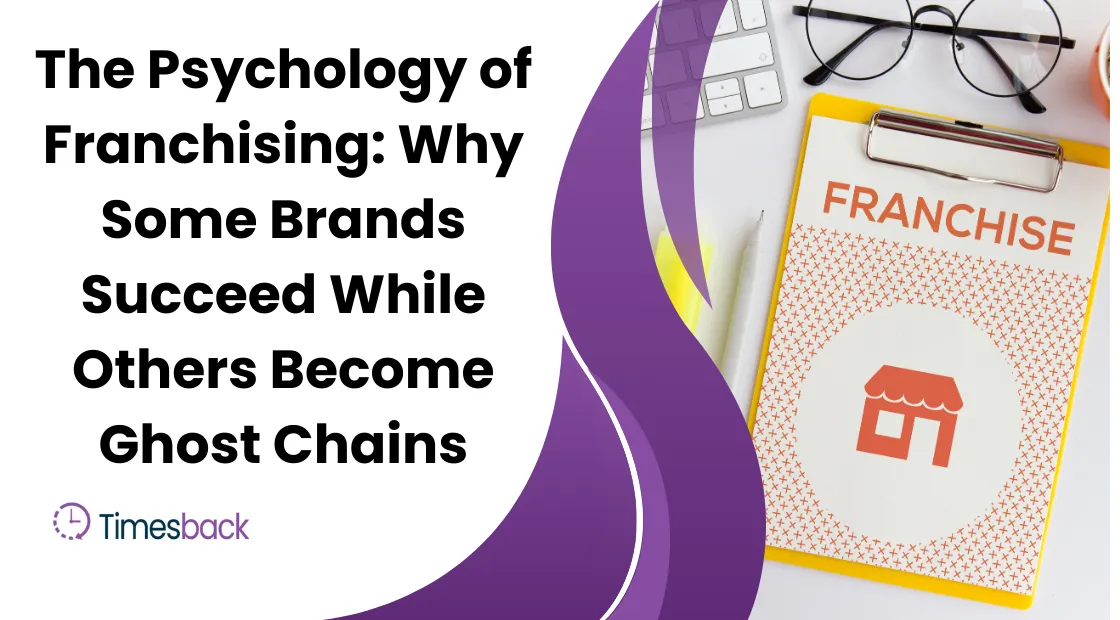The Psychology of Franchising: Why Some Brands Succeed While Others Become Ghost Chains

Franchise psychology plays a pivotal role in determining why some brands flourish while others fade into obscurity.
Anúncios
The difference between a thriving franchise and a “ghost chain” (abandoned locations with dwindling customer bases) often lies in understanding consumer behavior, franchisee motivation, and brand adaptability.
This article explores the psychological drivers behind franchise success and failure, backed by data, expert insights, and real-world examples.
Understanding the nuances of franchise psychology can provide valuable insights for both aspiring franchisees and established franchisors.
Anúncios
By recognizing the factors that contribute to success or failure, stakeholders can make informed decisions that align with market demands and consumer preferences.
Moreover, the psychological dynamics at play can influence everything from marketing strategies to operational management.
Franchises that effectively harness these psychological insights can create a sustainable competitive advantage that keeps them relevant in an ever-changing marketplace.
The Franchise Success Formula: More Than Just a Business Model
A franchise isn’t just a legal agreement—it’s a psychological contract between brand and franchisee.
Successful franchises master three key elements:
- Brand Trust – Consumers gravitate toward familiarity. A 2022 Nielsen study found that 60% of buyers prefer brands they recognize, even if cheaper alternatives exist.
- Franchisee Empowerment – Motivated owners perform better. Brands that provide training, marketing support, and fair profit margins see higher retention.
- Adaptability – Markets evolve; stagnant franchises die.
Table 1: Key Psychological Triggers in Franchise Success
| Psychological Factor | Impact on Franchise Success | Example |
|---|---|---|
| Brand Recognition | Builds consumer trust | McDonald’s golden arches |
| Perceived Value | Justifies premium pricing | Starbucks’ “third place” appeal |
| Community Integration | Enhances loyalty | Chick-fil-A’s local engagement |
The interplay between these factors creates a robust foundation for franchise growth.
When brands invest in building trust and empowering their franchisees, they cultivate a loyal customer base that translates into long-term success.
Additionally, franchises that prioritize adaptability can pivot quickly in response to market shifts, ensuring they remain competitive.
For instance, brands that actively seek feedback from both customers and franchisees can identify areas for improvement and innovation, leading to enhanced satisfaction and loyalty.
Ultimately, the success of a franchise hinges on its ability to foster a positive psychological environment for both consumers and franchisees alike.
+ What Makes a Franchise Successful? Insights from Industry Experts
Why Do Franchises Fail? The Ghost Chain Phenomenon
Ghost chains—once-promising brands now reduced to empty storefronts—often collapse due to psychological mismanagement.
Common pitfalls include:
- Overexpansion Without Demand – Rapid growth dilutes brand value (e.g., Quiznos).
- Poor Franchisee-Brand Alignment – Conflicts over fees, supply costs, or creative control erode relationships.
- Failure to Evolve – Blockbuster ignored streaming; now it’s a cautionary tale.
The Role of Cognitive Biases in Franchise Decisions
Both franchisors and franchisees fall prey to cognitive biases:
- Survivorship Bias – Assuming past success guarantees future results.
- Sunk Cost Fallacy – Pouring money into failing locations due to emotional attachment.
- Bandwagon Effect – Jumping into trendy markets without proper research (e.g., the frozen yogurt boom and bust).
Understanding these biases is crucial for making informed decisions in the franchise landscape.
By recognizing the psychological traps that can lead to failure, franchisors and franchisees can develop strategies to mitigate risks and enhance resilience.
Moreover, franchises that actively educate their franchisees about these cognitive biases can foster a more informed decision-making process, reducing the likelihood of costly mistakes.
For example, providing training that highlights the importance of market research can help franchisees avoid the bandwagon effect and make choices based on data rather than trends.
Ultimately, addressing these psychological pitfalls can empower franchises to navigate challenges more effectively and sustain their growth.

Case Study: The Rise and Fall of Subway vs. Domino’s Reinvention
Subway, once the world’s largest franchise, faced decline due to inconsistent quality and franchisee dissatisfaction.
Meanwhile, Domino’s leveraged franchise psychology by:
- Listening to Customer Feedback – Revamped recipes based on criticism.
- Tech Integration – Simplified ordering via AI and apps.
- Franchisee Support – Transparent profit-sharing models.
Table 2: Subway vs. Domino’s – A Psychological Comparison
| Factor | Subway’s Approach | Domino’s Strategy | Result |
|---|---|---|---|
| Brand Perception | Stagnant, outdated | Modern, tech-savvy | Domino’s stock surged 1,200% in a decade |
| Franchisee Relations | High fees, low support | Profit-focused, collaborative | Domino’s franchisee satisfaction: 85% |
| Innovation | Slow to adapt | Aggressive digital transformation | Domino’s leads in delivery tech |
The contrasting approaches of Subway and Domino’s highlight the importance of adaptability and responsiveness to market changes.
As consumer preferences evolve, franchises must be willing to innovate and listen to both customers and franchisees to remain competitive.
Additionally, Domino’s focus on technology has not only streamlined operations but also enhanced the customer experience, leading to increased loyalty.
By proactively addressing franchisee concerns and fostering open communication, Domino’s has cultivated a strong network of satisfied franchisees who are invested in the brand’s success.
This case study demonstrates how understanding franchise psychology can lead to effective strategies that drive growth and sustainability in a competitive landscape.
++ Low-Cost Franchises: Affordable Business Opportunities to Start Today

How Emerging Franchises Leverage Psychology to Thrive
Newer brands like Sweetgreen and Dunkin’ succeed by tapping into modern consumer psychology:
- Health-Conscious Positioning – Sweetgreen appeals to wellness trends.
- Convenience & Personalization – Dunkin’s app rewards drive repeat visits.
- Emotional Branding – Brands that tell a story (e.g., Shake Shack’s “roadside burger” nostalgia) create deeper connections.
These emerging franchises understand that connecting with consumers on an emotional level can lead to increased loyalty.
By aligning their offerings with contemporary values and preferences, they position themselves for sustainable growth in a competitive market.
Moreover, the use of technology to enhance customer experience has become a hallmark of successful franchises today.
For instance, Dunkin’s app not only simplifies ordering but also fosters a sense of community among its users, encouraging repeat business through rewards and personalized offers.
As these brands continue to evolve, their ability to adapt to changing consumer behaviors will be crucial for long-term success.
Conclusion: The Future of Franchising Lies in Psychological Insight
Understanding franchise psychology isn’t optional—it’s essential.
Brands that prioritize trust, adaptability, and franchisee satisfaction dominate, while those ignoring these principles become ghost chains.
The lesson? Franchising isn’t just about scale; it’s about human behavior.
By mastering these psychological triggers, franchises can avoid becoming footnotes in business history—and instead, shape the future of retail.
As the landscape of franchising continues to evolve, those who embrace psychological insights will be best positioned for success.
Furthermore, the integration of psychological principles in franchise operations can lead to enhanced brand loyalty and customer retention.
Franchises that invest in understanding their consumers and franchisees will not only thrive but also set new standards for excellence in the industry.
Ultimately, the future of franchising will be defined by brands that prioritize psychological insight as a core component of their business strategy.
